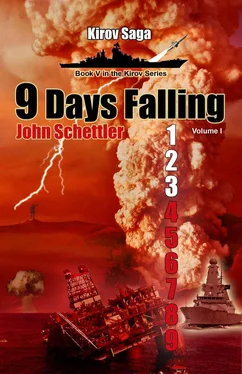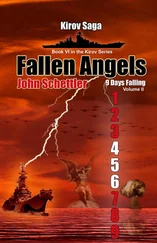Largely gutted, with the interior completely rebuilt above the waterline, the ship now housed corporate offices at sea, and with lavishly appointed executive cabins, a full dining room, library, data center and expanded hanger space aft for four helos. To round things off, Ms. Fairchild insisted on a small company of her very own security men, all ex-military types sworn to their new posts in a secret ritual that none would ever openly discuss. This fifty man contingent of Argonauts sailed with the ship at all times, and they were outfitted with a small flotilla of fast boats for offshore and inshore service. Dressed always in commando black, the men were a formidable presence when deployed on any security mission requiring their particular talents.
As he stepped out on the aft helo deck Captain MacRae noted that he was a good match for his ship, where a liberal use of naval white now covered her newly tapered lines. The more military colors, blues, grays, hazard schemes and dazzle paint, were not to be her dress code, ever again. Argos Fire was wearing dress whites in the service of Elena Fairchild now, and she would have to mind her manners in the bargain, just like the Captain and crew. But a ship never really could change her true temperament, no matter how she was rigged. MacRae could still feel the raw strength of the metal under his feet, the surging power her new engines were capable of, and he knew, more than any other, just how indelicate his vessel could be if it ever came to a brawl on the high seas in the service of the company—the reason Argos Fire had been built in the first place.
It was a dangerous world out there, on both land and sea now that the long discussion of Hubbert’s Peak had finally resolved itself into an ever more serious decline in oil production figures. Peak oil was a reality that was now self-evident, and no amount of rock squeezing ‘fracking’ was going to change that. All the world’s major fields were in decline, Ghawar in Saudi Arabia, Burgon in Kuwait, Cantarell in Mexico, the Russian fields administered by Lukos, and forget the North Sea. Only the massive young superfield of Kashagan in the Caspian was still viable, yet that area was now a hotbed of political contention—soon to be military contention, he thought. Britain, once a net exporter of oil, was now slowly starting to feel like Japan, relying more and more on imports.
The Royal Navy ain’t what she used to be, MacRae thought. The sun had long since set on the British Empire as well—it was setting, in fact, on the American Empire at this very moment, though you couldn’t get a neocon worth his salt to admit that. This is why small producers and shippers like Fairchild were becoming more and more important in the service to the Crown. They filled and guarded the oil tankers, and brought the energy home to a still gluttonous society that was just starting to catch a glimmer of the truth about the world’s energy situation.
But for now, decked out in his dress whites, Captain Gordon MacRae had more pleasant things to consider. It was nigh on four bells, eighteen hundred hours, six PM, well into the mid-watch. The Rotterdam was long gone, its captain probably still thinking about that case of Pinot Noir. The Argos Fire had slipped into the harbor for its brief visit and the helo from Alexandria was ready to land. His guest would be waiting, the dining hall would be receiving soon, and he thought he had better get moving.
He stopped by the radio room on his way to check on local wire traffic. “Anything that might spoil my dinner on the black line?” he asked his radio man, Simms. The black line was for Intelligence feeds, connected to some very secure sources.
“No good news tonight,” said Simms. “The Chinese are up in arms and ready to set sail for Taiwan, the Russian Navy has surged in the Pacific and Norwegian Sea, there’s trouble in the Gulf of Mexico and on the BTC pipeline through Turkey.”
That got MacRae’s attention at once. “The BTC line?”
“Bunker bust, Captain, and a big one. The PKK claims responsibility, and early reports are that they blew up a mile of pipeline and shut the whole line down.”
“I see…” MacRae remembered a conversation he had with his Intelligence Master, Mack Morgan, two days ago. It seems they had picked up word that an attack was coming, but like all terrorist threats the target was difficult to nail down. Miss Fairchild won’t like that news, he thought. He knew she was here to look for a conveyance contract from Ceyhan, the terminal port on the BTC line, which stood for Baku-Tbilisi-Ceyhan.
“And one more message, sir,” Simms scratched his head. “Not sure what to make of it. It’s another undisclosed threat in the Persian Gulf.”
“Again?” MacRae shook his head.
“Something about the Straits of Hormuz, sir.”
“Well let me have it.” He took the decrypt, scanning it briefly and seeing a word there that gave him a chill… mines . He folded it quickly, slipping it into his pocket.
“I’ll see that her ladyship is informed,” he said quietly.
But she won’t like it, he thought as he went. She won’t like it one bit. She hustled three tankers out of bed last week and got them into the Med as though the company’s life depended on it. Some big operation is in the wind, no doubt, and she was counting on the BTC line delivering the goods. Trouble in the Gulf of Mexico, trouble on the BTC line, trouble in the Persian Gulf. Someone was making a rather obvious and deliberate effort to shut down all the vital oil and gas centers of the world. Mack Morgan had the first two on his black network days ago, but this bit here in my pocket is going to cause more than a few wrinkles in the plan. Princess Royal is in the Persian Gulf with a belly full of oil… Mines?
Trouble… He could feel it. MacRae’s Scottish nose had a sense for danger like few other men, and he knew that before the night was over Argos Fire would be sailing into very dangerous waters.
“It is the cause, not the death, that makes the martyr.”
~ Napoleon Bonaparte
“Listen,my friends,” said Mironov. “If you think you aren’t being watched, you are deluded. They watch everyone now, particularly on the trains. It’s the only way you can get from one place to another, and so the stations and coaches are crawling with Okhrana.”
The three men sat at the table, leaning heavily over their half eaten breakfast, deep in conversation. Mironov nodded gravely as he finished, dipping a piece of sourdough bread into his kasha grain porridge. “Particularly you,” he pointed a finger at the young British reporter as the third man, a tall Uzbek guide, sopped up his egg yolk with a piece of bread. “Foreigners get special attention.”
“I see,” said the reporter, a man named Thomas Byrne, speaking passable Russian, and enlisting the aid of his guide when he needed help. He looked over his shoulder, as if he might see a security agent leering at him from another table, but they were the first to arrive in the dining room that morning, a few minutes before seven, and the hotel was not heavily booked in any case. Even so, images of people he had seen on the long journey, lean faced, bearded men in black overcoats and dark Ushankas, haunted his memories.
“Ask him why the government would want to bother with the likes of me. I’m just a commoner, here to report on the Great Race for the Times of London.” Byrne decided to put his guide to work so he could focus on his porridge.
Mironov spoke again, half smiling. “A commoner, he says.” The young man smiled at him. “Where foreigners are concerned there are no commoners. Every last one is suspect. I have little doubt that you were followed every mile and step of your journey, from the moment you set foot in our country, my friend. And you must be very cautious, because they will find out what you write and report, and if they don’t like it…” He let that dangle for a moment, a grin on his face. “Well, you could end up in prison, just as I did.”
Читать дальше












